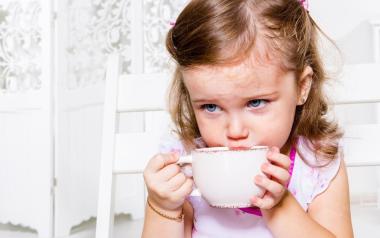It can be really heartbreaking when your little one isn’t feeling well, whether it is due to a tummy ache, constipation, sore throat or irritability and restlessness. Rather than going straight for your over-the-counter medications, there are great natural home remedies you can try. It also makes for a nice ritual when you’re not feeling the best: sharing a cup of tea with your child.
Herbal teas can offer a lot of benefits and are relatively easy to prepare. Also called a “hot water infusion”, it is the process of steeping a dried herb in hot water while the key medical constituents are drawn out into the water. The wonderful thing about infusions is that they can be administered internally (drinking them as a tea), added to a bath, or used as a compress on the skin.
Administering herbs in a bath works great for infants and children under the age of 3. Prepare the tea as described below, but then add it to warm bath water (before placing the child in the tub, make sure to always check water temperature). Because infants have such a large skin surface area compared to their body weight, having their skin exposed to the infusion is often more efficient for absorption1 especially because their gastrointestinal (GI) systems aren’t as developed relative to teens and adults.
Herb and tea remedies for gentle illness relief
Lemon Balm (Melissa officinalis)
- Relieves spasms in the GI tract. Good for general tummy aches.
- Relaxing. Can help with anxiety or with trying to fall asleep.
- Hot water extracts have antiviral properties. Adding a prepared infusion to bath water may help combat an influenza infection or chickenpox2.
Chamomile (Matricaria recutita)
- Relaxes the whole body. Can help ease anxiety or be used as a calming agent for sleep.
- Soothes the walls of the GI tract: Good for gas or colic pains
- Can help relieve non-infectious diarrhea and constipation
- Can be added to bathwater to soothe teething infants2
- Can also be used in bathwater for soothing eczema3
Echinacea
- Enhances the immune system; great for use during colds or flu.
- Used for respiratory tract infections, sore throats, eye and ear infections.
Marshmallow root (Althea officinalis)
- As a demulcent, it coats and soothes mucous membranes. It can be very helpful for a sore throat.
- Can be used in asthma, especially for kids with “scratchy” dry throats who have an overactive cough reflex.
- Safety note: Give away from any other medication as it may delay their absorption.
Ginger (Zingiber officinalis)
- As an expectorant, it can help kids cough up any mucous that is sitting in their chests/lungs.
- Helps relieve nausea and motion sickness.
- Promotes sweating during a fever.
- If you can’t find dried ginger prepared as a tea, you can also create your own hot water infusion by cutting a few slices (about 2 inches worth) of fresh ginger and allowing them to simmer in about 2 cups of water in a pot on the stove. Simmer for 10 minutes, covered, then remove from heat allow it to steep for another 20 minutes, covered.
You can keep these teas in your house and bring them out whenever you need them. Make sure to store all dried herbs/teas in a dry space away from heat. When making your hot infusion use about 1 rounded teaspoon per one cup of boiling water. Steep all teas covered for 10 minutes, then add a few ice cubes to cool them down for kids.
As a general rule, kids 3-5 years old can drink a ¼ cup and kids 6 to 10 years old can drink a half cup. By 10-12 years of age, the gastrointestinal tract is usually fully developed and therefore kids in pre-teens and adolescence can usually tolerate the adult dose of 1 cup. Doses can be repeated in about an hour if symptoms persist. As a safety warning, these herbs should not be used if your child has an allergy to the Asteracea family of plants/flowers.
Because some of the herbs don’t necessarily taste great to children, you can add a little bit of honey to sweeten the pot.
Enjoy testing out new tea therapy with your family!
References
1. Santich, Rob and Kerry Bone. Phytotherapy Essentials: Healthy Children: Optimising Children's Health with Herbs. Warwick, Queensland: Phototherapy, 2008. Print
2. Hoffmann, David. Medical Herbalism: The Science and Practice of Herbal Medicine. Rochester, VT: Healing Arts, 2003. Print
3. Godfrey, Anthony, and Paul Richard Saunders. Principles & Practices of Naturopathic Botanical Medicine. Toronto: Canadian College of Naturopathic Medicine, 2010. Print.








